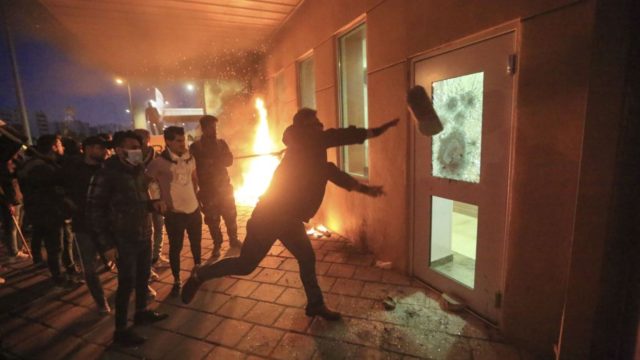
This will not be Tehran 1979. Nor Benghazi 2012.
There were, apparently two groups of invaders at the U.S. embassy in Baghdad — hordes of rioting protesters in the streets and well-covered, professional-looking, careful militia members entering the out building. Security forces (and some contractors) used tear gas and stun guns against the demonstrators as the United States protected its embassy compound — sovereign American territory by international convention.
A bit of U.S.-Iranian history is instructive here. When the Iranians overran the U.S. embassy in Tehran in 1979, President Jimmy Carter dubbed the Ayatollah Khomeini “a holy man” with whom, presumably, one could do business. President Barak Obama was certain, in 2015, that “the only alternative to the JCPOA is war with Iran,” presumably meaning that the so-called “Iran nuclear deal” was the way to avoid war and restore Iran to the family of nations.
The result of Carter’s assistance to the ayatollah, and Obama’s lapse in memory — the Iranians had, actually, been in a declared state of war with the United States (and Israel) since 1979 — was to allow the juggernaut of Shiite expansionist theology to ruin Iran, invade Iraq, incubate ISIS, occupy Syria, bring its proxy to power and ruin Lebanon, run the Houthi war in Yemen, undermine Bahrain, attack Saudi Arabia, and spread its tentacles across Africa. And this transpired all while Iran violated the U.N. ban on Iranian arms imports and exports, the U.N. ban on the development of Iranian ballistic missiles, and the P5+1-ratified-by-the-U.N. ban on the development of nuclear weapons technology.
President Donald Trump harbors no such fantasies. He has already shown that retaliation for acts of war is in his playbook. But he has also shown that it isn’t necessary to retaliate every time for every single thing — including Iran’s attack on Saudi oil facilities.
As Iran’s tentacles have spread farther, it has begun to show signs of “imperial overreach.” The re-imposition of American sanctions means Iran has fewer and fewer resources to stoke the flames of revolution extraterritorially. Rebellion against the clerical regime actually began in December 2017 — not 2019, when The New York Times began to report on it. Uprisings in Lebanon and Iraq began earlier this year — both decidedly anti-Iran and anti-clerical. And, as Iran watches Russia swallow Syria’s reconstruction money for its own purposes, the mullahs appear to have decided it is now time for Iran to reassert itself.
Iranian forces are out in the streets of multiple Iranian cities and the U.S. confirms that the death toll among demonstrators is more than 1,500, including hundreds of women. The ayatollahs have cut off the internet, to the extent they can, to prevent Western understanding of the devastation. Iranian-backed Shiite militias have been out in force in Iraq — not only in Baghdad, but in Shiite cities across the south of the county. The Lebanese Armed Forces (LAF) plus Hezbollah militias are trying to get Lebanon under control with some brutal tactics.
It hasn’t been working very well.
A wounded adversary is the most dangerous. The 1944 Battle of the Bulge reflected Hitler’s understanding that the Allies would not be held off forever, so he wanted to make it harder and bloodier to reach V-E Day. Emperor Hirohito’s determination that every Japanese civilian would fight to the death on the mainland — knowing defeat was inevitable — was the impetus for President Truman’s use of the atomic bomb (in part) to short-circuit the casualty count, assessed by analysts to be in the millions.
This is NOT a suggestion that the U.S. storm Iran — or heaven forbid, use an atomic or other weapon against Iranian cities. Not, not, not!
It is, however, a reminder of what we face. Iran has been begging for the sort of American retaliation that it could (A) use to try to bring its population together in opposition to the “Great Satan,” or (B) use to launch Hezbollah to attack Israel, presenting the U.S. with the conundrum that legitimate American retaliation might harm an ally. The death of an American contractor and wounding of several American soldiers last week in Iraq — in a barrage of more than 30 rockets — followed weeks of Pentagon warnings that Iranian-backed groups in Iraq were likely to attack U.S. forces there.
American retaliation was precise, hitting three sites: Weapons storage facilities and locations the militia used to plan attacks against coalition forces.
What happens next is unclear. At this writing, reinforcements for the U.S. embassy have been called in. But there is a clear understanding in Washington that this is not an uprising of Iraqis against the United States. These are Iranian acts of war. Where American retaliation goes will, no doubt, take that into account.





